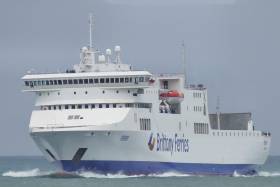Displaying items by tag: French flagged ferry
Brittany Ferries Celebrates Another French-Flagged Ship As Connemara Relocates from Ireland Routes
Brittany Ferries’ Connemara has been welcomed today to the shipping register of France, creating jobs for French seafarers and bringing to 11 the number of ships of the fleet sailing under the red, white and blue of the tricolour.
Afloat adds that ferry Connemara at the end of October completed its final Cork-Santander sailing, however another ropax Kerry has taken over on the year-round operated Irish-Iberian link by crossing the Bay of Biscay with an arrival to the Spanish port this morning. A previous scheduled sailing was cancelled due to adverse weather conditions which led Kerry vacating the ferry linkspan at Ringaskiddy terminal. Afloat tracked the ropax upriver in Cork Harbour at the Marino Point jetty.
As for the seasonal Cork-Roscoff route, Pont-Aven carried out the final crossing of 2019 departing the Irish port last Saturday. Services resume in March 2020.
Returning to Connemara, Brittany Ferries add that the ropax originally joined the fleet in May 2018 to open a new route between Cork and Santander – the first ever direct ferry route between Ireland and Spain. The chartered ship (Afloat also adds served Cork-Roscoff) had initially sailed under a European flag, but with a clear commitment that it would be transferred to the French register and crewed by French sailors after two years of operation.
This commitment has now been fulfilled six months early, allowing for the creation of 111 jobs for French crew-members, including 25 officers.
“We’re delighted and proud to raise the French flag aboard Connemara,” says Brittany Ferries CEO Christophe Mathieu. “Despite the current uncertain economic and political waters we’re navigating Brittany Ferries continues its development, and reaffirms its long-term commitment to the French flag, and its position as the biggest employer of French seafarers.”
Following regulatory checks by maritime authorities in Spain, France and UK, Connemara will sail for the first time under the French flag on 13th November, operating a service from Santander in northern Spain to Portsmouth, UK. During December it will link Poole with Cherbourg, covering for fleet mate Barfleur which will undergo an extensive refit. Then in January 2020 Connemara will begin operating services between Portsmouth and Le Havre.
Connemara is at the vanguard of a wave of French-flag ships which will arrive over the next four years as part of a €550 fleet renewal programme.
Honfleur will be delivered from the German FSG shipyard in 2020 and will serve the Portsmouth-Caen route. This is to be followed by three brand new ‘E-Flexer’ class ships to serve longhaul on UK-Spain routes: Galicia in late 2020, Salamanca in 2022, and Santoña in 2023.






























































